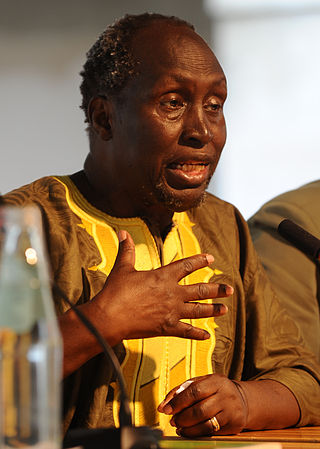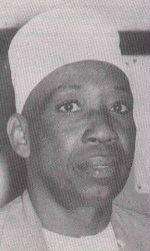Related Research Articles

Swahili, also known by its local name Kiswahili, is the native language of the Swahili people, who are found primarily in Kenya, Tanzania and Mozambique. It is a Bantu language, though Swahili has borrowed a number of words from foreign languages, mainly Arabic and Persian, as well as words from Portuguese, English and German. Around forty percent of Swahili vocabulary consists of Arabic loanwords, including the name of the language. The loanwords date from the era of contact between Arab slave traders and the Bantu inhabitants of the east coast of Africa, which was also the time period when Swahili emerged as a lingua franca in the region. The number of Swahili speakers, be they native or second-language speakers, is estimated to be around 80 million.

Tanzania, officially the United Republic of Tanzania, is a country in East Africa within the African Great Lakes region. It borders Uganda to the north; Kenya to the northeast; the Indian Ocean to the east; Mozambique and Malawi to the south; Zambia to the southwest; and Rwanda, Burundi, and the Democratic Republic of the Congo to the west. Mount Kilimanjaro, Africa's highest mountain, is in northeastern Tanzania. According to the 2022 national census, Tanzania has a population of nearly 62 million, making it the most populous country located entirely south of the equator.

"Mungu ibariki Afrika" is the national anthem of Tanzania. It is a Swahili language version of Enoch Sontonga's popular hymn "Nkosi Sikelel' iAfrika".

Ngũgĩ wa Thiong'o is a Kenyan author and academic who writes primarily in Gikuyu and who formerly wrote in English. He has been described as having been "considered East Africa's leading novelist". His work includes novels, plays, short stories, and essays, ranging from literary and social criticism to children's literature. He is the founder and editor of the Gikuyu-language journal Mũtĩiri. His short story The Upright Revolution: Or Why Humans Walk Upright, is translated into 100 languages from around the world.

Shaaban bin Robert, also known as Shaaban Robert, was a Tanzanian poet, author, and essayist who supported the preservation of Tanzanian verse traditions. Robert is celebrated as one of the greatest Tanzanian Swahili thinkers, intellectuals and writers in East Africa and has been called "poet laureate of Swahili" and is also known as the "Father of Swahili." He is also honoured as the national poet.
Euphrase Kezilahabi was a Tanzanian novelist, poet, and scholar. Born in Ukerewe, Tanganyika, he last worked at the University of Botswana, as an associate professor at the Department of African Languages.

Following Tanganyika's independence (1961) and unification with Zanzibar (1964), leading to the formation of the state of Tanzania, President Julius Nyerere emphasised a need to construct a national identity for the citizens of the new country. To achieve this, Nyerere provided what has been regarded by some commentators as one of the most successful cases of ethnic repression and identity transformation in Africa.

Mwanza Region is one of Tanzania's 31 administrative regions The region covers a land area of 25,233 km2 (9,743 sq mi). The region is comparable in size to the combined land area of the nation state of North Macedonia. Mwanza Region is bordered to the north through Lake Victoria by the Kagera Region and Mara Region, to the east by Simiyu Region, to the south by the Shinyanga Region and to the west by Geita Region. The regional capital is the city of Mwanza. According to the 2022 national census, the region had a population of 3,699,872 and national census of 2012 had 2,772,509. Mwanza Region is the second region with high population in Tanzania after Dar es Salaam Region
Uhuru Stadium is adjacent to the National Stadium in Miburani ward of Temeke District in Dar es Salaam, Tanzania.

The Shambaa people, also called the Sambaa, Shambala, Sambala or Sambara, are a Bantu ethnic group. Their ancestral home is on the Usambara Mountains of Lushoto District, Bumbuli District. They are native to the valleys and eastern Usambara Mountains of Korogwe District, Korogwe Urban District and western Muheza District of northern Tanga Region of Tanzania. The word Shamba means "farm", and these people live in one of the most fertile Tanzanian region. Shambaai in Kisambaa means "where the banana's thrive". In 2001, the Shambaa population was estimated to number 664,000.
Aniceti Kitereza (1896–1981) was a Tanzanian Catholic cleric and novelist, born in 1896 on the island of Ukerewe, in Lake Victoria, in modern day Ukerewe District of Mwanza Region in Tanzania. In 1945, he wrote the first novel in his native language, Kikerewe. Only in 1981, it was published in Swahili under the title Myombekere na Bugonoka na Ntulanalwo na Bulihwali.
Ali Muhsin Al-Barwani was a Zanzibari politician and diplomat under the Sultanate of Zanzibar. He was the only Arab foreign minister of an independent Zanzibar before the establishment of the People's Republic of Zanzibar. When his government was overthrown in January 1964 Barwani was held in detention centers across Tanzania until his release in 1974, when he fled to Kenya as a refugee. After obtaining refugee status, Barwani moved to Cairo then back to Kenya then to Dubai in the United Arab Emirates. In the UAE, Barwani translated the Qur'an into Swahili Qur'an for which he is most prominently known.
The Black Hermit was the first play by the Kenyan author Ngũgĩ wa Thiongʼo, and the first published East African play in English. The travelling theatre of Makerere College was the first to produce the play, putting it on in honour of Ugandan independence at the Ugandan National Theatre in Kampala in November 1962. The play was published in a small edition by Makerere University Press in 1963, and republished in the Heinemann African Writers Series in 1968.
Up to the second half of the 20th century, Tanzanian literature was primarily oral. Major oral literary forms include folktales, poems, riddles, proverbs, and songs. The majority of the oral literature in Tanzania that has been recorded is in Swahili, though each of the country's languages has its own oral tradition. The country's oral literature is currently declining because of social changes that make transmission of oral literature more difficult and because of the devaluation of oral literature that has accompanied Tanzania's development. Tanzania's written literary tradition has produced relatively few writers and works; Tanzania does not have a strong reading culture, and books are often expensive and hard to come by. Most Tanzanian literature is orally performed or written in Swahili, and a smaller number of works have been published in English. Major figures in Tanzanian modern literature include Shaaban Robert, Muhammed Said Abdulla, Aniceti Kitereza, Ebrahim Hussein, Abdulrazak Gurnah and Penina Muhando.

Mathias E. Mnyampala (1917–1969) was a Tanzanian writer, lawyer, and poet. Mnyampala was born on 18 November according to a personal record form of 1956, but he wrote in his autobiography that he only knew the year with accuracy. He was born in the hamlet of Muntundya depending on the village of Ihumwa in Chamwino District in Dodoma region at the time part of German East Africa. He died on 8 June 1969 in Dodoma city, Tanzania. Mnyampala wrote in Swahili, the lingua franca of East Africa, not Cigogo, the native language of his ethnic group.
Mr. Myombekere and His Wife Bugonoka, Their Son Ntulanalwo and Daughter Bulihwali is a novel by Tanzanian author Aniceti Kitereza. The novel is an extended story depicting historical life of the Kerewe through three generations.
Olivier Barlet is a French journalist, translator, film critic and researcher on African cinema and its diasporas.
References
- 1 2 3 4 Killam, G. D.; Kerfoot, Alicia L. (2008). Student Encyclopedia of African Literature. ABC-CLIO. p. 273. ISBN 978-0-313-33580-8.
- 1 2 Gérard, Albert S. (1986). European-language Writing in Sub-Saharan Africa. John Benjamins Publishing. p. 957. ISBN 978-963-05-3834-3.
- ↑ Killam, G. D. (1984). The Writing of East and Central Africa. East African Publishers. pp. 63–64. ISBN 978-0-435-91671-8.
- 1 2 Gikandi, Simon; Mwangi, Evan (2007). The Columbia Guide to East African Literature in English Since 1945. Columbia University Press. p. 159. ISBN 978-0-231-12520-8.
- ↑ "African Books Collective: Mr. Myombekere and his Wife Bugonoka, Their Son Ntulanalwo and Daughter Bulihwali".
- ↑ "Gabriel Ruhumbika | Comparative Literature". University of Georgia . Retrieved 1 February 2013.